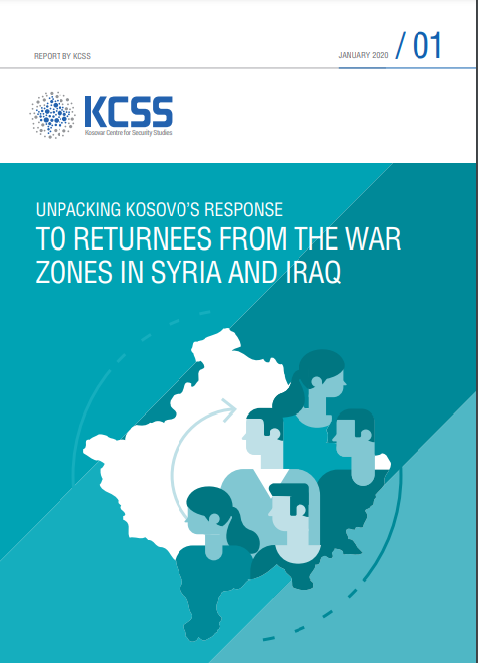19/01/2020

Kosovar Centre for Security Studies (KCSS)
International Republican Institute (IRI)
Skender Perteshi & Ramadan Ilazi
This report finds that the government of Kosovo as well as civil society have, overall, positively responded to the needs of the returnees and supported their reintegration, albeit shortcomings with the extent of implementation of proclaimed commitments towards the returnees. Upon arrival in Kosovo institutions provide medical care, temporary housing, mental health sessions, while preparing them for reintegration in the society. Kosovo has two overall approaches to the returnees: punitive-restorative approaches and societal reintegration programs. Following a period of 72 hours returnees are interrogated by authorities to determine their roles in the war zones in Syria and Iraq, while confirmed foreign fighters are arrested. The first set of measures deals with those Kosovars who are found to have committed a criminal offense for participating in a foreign conflict in accordance with the national legislation. While in the correctional service, foreign fighters are offered access to programs that aim to help them with skills development to increase their employability, completion of education, as well as, training and lectures that target radical religious beliefs.
At the same time, the government has established a special division in the Ministry of Internal Affairs to exclusively work on coordinating and providing support for reintegration process of the returnees. Returnees are supported with housing, registering the children in the school, an emergency financial assistance package, counselling sessions, and continued support through the social welfare scheme. The report also finds that majority of the returnees have been successfully resettled in the society, and this is as a result of the strong community and family ties. Family and community ties were essential to also ensure effective reintegration of orphaned children. This is a demonstration of a strong social cohesion in Kosovo that has provided the most significant factor when examining reintegration of the returnees. Notes from the four focus groups in four different regions of Kosovo: Prizren, Mitrovica, Gjilan and Kacanik, confirm that all citizens are welcoming of the returnees and harbor no discriminatory approaches that would impede their reintegration. These development show that reintegration of the returnees is most effective when it is not entirely orchestrated or managed by government, but it is facilitated by community and the well-kept family ties.
The report also finds that in practice government lacks a coherent policy and there are serious shortcomings with coordination and inclusion of civil society in the process.
This project was supported by the International Republican Institute (IRI). The views expressed in this research are those of Kosovar Centre for Security Studies and do not necessarily represent those of the IRI.